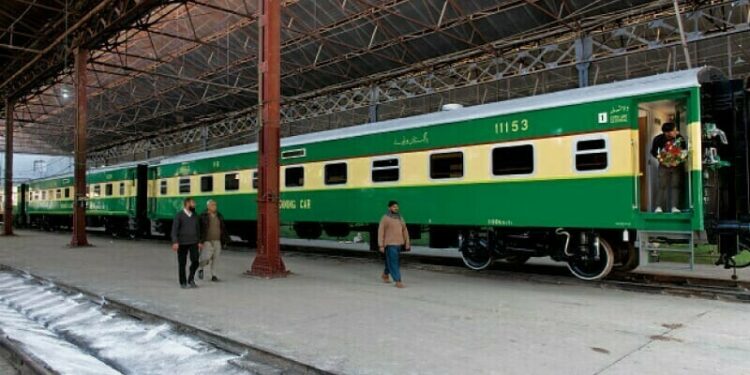Train Suspended Overnight for Passenger Safety
In a significant development highlighting the ongoing security challenges in Pakistan’s southwestern province, the Quetta-bound Bolan Mail (3UP) was stopped at Jacobabad railway station late Sunday night over serious security concerns. The train, which had departed from Karachi, was on its way to Quetta when authorities intervened and ordered the halt.
According to officials from Pakistan Railways, the decision to stop the train was taken to ensure the safety of passengers, as operations in the Balochistan region are restricted during nighttime due to potential security threats. The stoppage sparked outrage among passengers, some of whom protested the decision and complained about inadequate compensation and communication from the authorities.
Security Threats Prompt Railway Halt in Jacobabad
Pakistan Railways Chief Executive Officer (CEO) Aamir Ali Baloch confirmed that the Bolan Mail was intentionally held at Jacobabad station on the orders of concerned security authorities. The train, carrying approximately 150 passengers, reached Jacobabad around midnight.
“We stopped the train at Jacobabad because operating trains in Balochistan at night is prohibited due to the security risks involved,” said CEO Aamir Ali Baloch. He emphasized that the decision was made in the best interest of the passengers’ safety, following a standard security protocol that requires clearance before any train enters volatile zones, particularly during the night.
Passengers Transported to Quetta by Road
A senior railway official from the Quetta Division elaborated that after the train was halted, Pakistan Railways coordinated with local security agencies to arrange alternative travel arrangements. Nearly 100 passengers who demanded immediate transport were shifted to Quetta and surrounding areas via buses under strict security measures.
However, passengers reported chaotic scenes as they were asked to disembark and wait indefinitely for updates or instructions. Some travelers, especially families with children and elderly members, expressed frustration over the lack of basic facilities at the Jacobabad station and the uncertainty surrounding their onward journey.
Conflicting Reports on Compensation and Arrangements
While Pakistan Railways claims that alternative arrangements were made for affected passengers, eyewitness accounts suggest a different story. Several travelers alleged that the train authorities failed to provide clear instructions or support, and many were forced to arrange private transport to continue their journey to Quetta.
Angry passengers claimed they had paid full fare from Karachi to Quetta but were left stranded midway. Some were reportedly refunded only Rs. 200, a fraction of the cost required to travel from Jacobabad to Quetta by road, which often exceeds Rs. 1,000 per person.
“This is unfair. They charged us for the full trip and abandoned us without proper compensation,” said one of the aggrieved passengers. Others echoed the sentiment, calling it a violation of their rights as paying customers of a public service.
Passenger Protests Erupt at Jacobabad Station
Eyewitnesses reported that a protest broke out at the Jacobabad railway station early Monday morning when several passengers refused to accept the partial refunds and demanded complete transparency and assistance from railway authorities.
“They didn’t even inform us why the train was stopped. We were just told to get off and find our own way,” said a passenger traveling with his family. Some travelers also alleged that the station lacked sufficient food, water, or resting arrangements for the large number of people stranded overnight.
Change in Train Timing Announced by Pakistan Railways
In light of this incident, Pakistan Railways issued a statement announcing a revision in the departure time of the Bolan Mail to prevent nighttime travel through Balochistan. Starting Tuesday, the 3UP train that previously departed from Karachi City Station at 7:00 PM will now depart four hours earlier at 3:00 PM.
Passengers with advance bookings were advised to check the updated schedule and adjust their travel plans accordingly to avoid any inconvenience.
This shift is part of broader safety measures being implemented by Pakistan Railways to minimize nighttime movement in sensitive areas and ensure safe, daytime travel across regions facing security threats.
Background: Security Challenges in Balochistan
The province of Balochistan has long faced security challenges due to the presence of militant groups, separatist movements, and cross-border criminal activities. In recent years, there have been frequent attacks targeting infrastructure, including railways, pipelines, and roads.
Because of this volatile situation, law enforcement agencies routinely advise caution and often halt or reroute transportation services during periods of heightened risk. Train services in Balochistan, especially at night, are highly restricted and require prior clearance from relevant security agencies.
Importance of Bolan Mail Route
The Bolan Mail is a vital railway connection between Karachi and Quetta, serving hundreds of passengers daily, including laborers, students, and families traveling between the provinces of Sindh and Balochistan. It also plays a role in transporting essential goods and supporting inter-provincial commerce.
The sudden suspension of this service — even temporarily — highlights the vulnerability of Pakistan’s transport infrastructure to regional instability. Passengers who rely on affordable railway options are often the most affected by such disruptions, especially in regions with limited alternative modes of transport.
Public Reaction and Social Media Response
Following the incident, social media platforms lit up with criticism directed at Pakistan Railways for the lack of preparation and poor communication with passengers. Several users shared videos of passengers protesting at Jacobabad station and called on authorities to take swift action to prevent future occurrences.
Railway advocacy groups have also urged the government to improve safety measures along sensitive routes and to ensure proper crisis management plans are in place so passengers are not left in the lurch during such disruptions.
Looking Forward: Need for Upgraded Rail Infrastructure and Coordination
The Jacobabad incident underlines the urgent need for Pakistan Railways to invest in better infrastructure, crisis response systems, and customer support services. With modernized systems and real-time communication tools, such incidents could be managed more efficiently and transparently.
Security coordination between railway authorities and law enforcement agencies must also be streamlined to provide timely updates and alternative arrangements to ensure passenger comfort and safety.
Conclusion
The sudden halt of the Quetta-bound Bolan Mail at Jacobabad railway station due to security concerns underscores the fragile security environment in Balochistan and the challenges faced by Pakistan’s railway system. While the safety of passengers is paramount, incidents like these highlight the pressing need for better planning, communication, and infrastructure investment.
Pakistan Railways’ decision to revise the train’s departure time is a step in the right direction, but long-term solutions are required to ensure uninterrupted, safe, and reliable rail travel across the country.

























